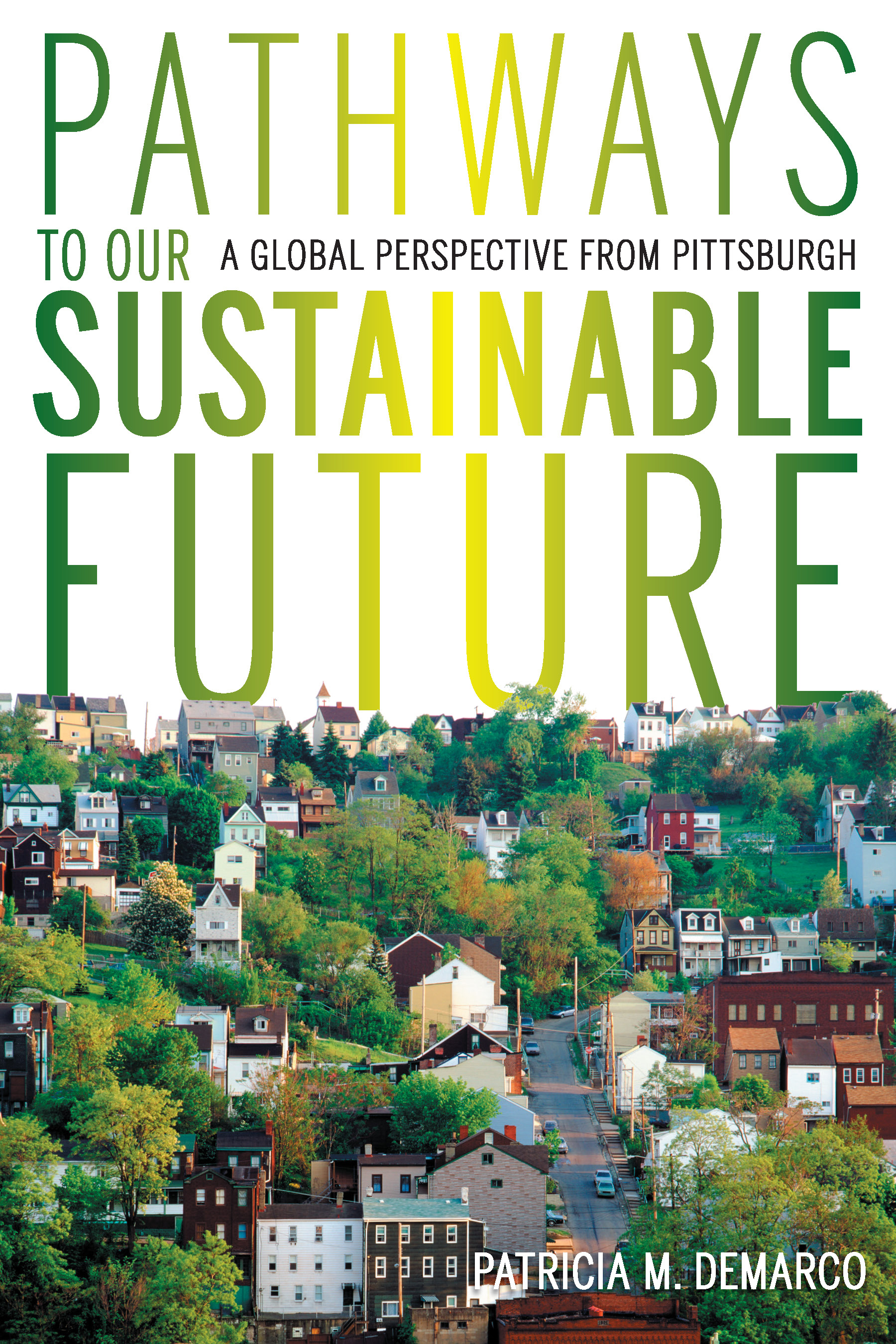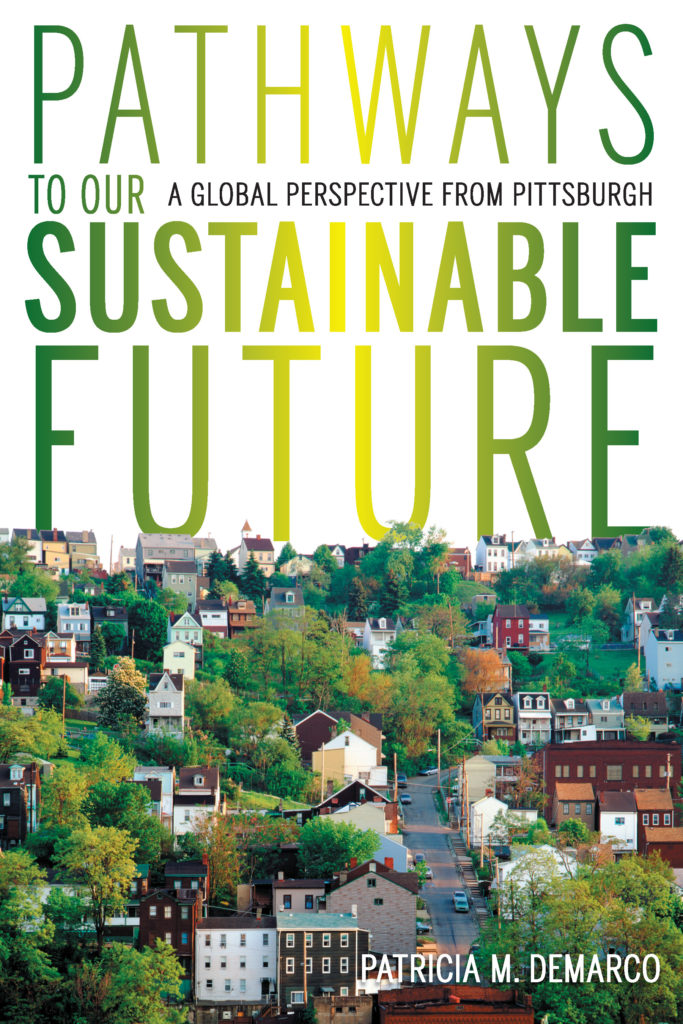University Press Week 2019: Four Ways to Be a Better Environmental Steward
University Press Week 2019: Four Ways to Be a Better Environmental Steward

November 3-9 is University Press Week. This year’s theme is “Read. Think. Act.” Our mission at the University of Pittsburgh Press is to find and publish the finest scholarly titles for just this reason: We want to encourage our readers to think critically about our titles and make changes in their lives, universities, and communities. This blog post by Patricia M. DeMarco, author of Pathways To Our Sustainable Future, offers a few ways anyone can take action to become a better environmental steward.
Four Ways to Be a Better Environmental Steward
Patricia M. DeMarco
As creatures of modern life, we are often insulated from the reality of the natural world by glass and concrete dwellings, making it difficult to experience an intimate connection to any living thing.
Becoming a steward of the earth requires only that we recognize our true place. The complex interconnections between the living and mineral components of Earth provide the life support system for all living things—fresh water, oxygen-rich air, fertile ground and the diversity of species that occupy cascading niches of the interconnected web of life.
Humans are but one part of this living earth and depend completely on the unseen systems that have co-evolved over millions of years to cycle and regenerate water, nutrients, and oxygen, and convert the energy of the sun into food, fuel, and fiber.
Human actions, especially from the industrialization of manufacturing and agriculture using fossil fuels, have stressed the life-supporting systems of the living earth. Population growth and wasteful consumption; resource extraction without regard for restoration or protection of critical environments; and the continued combustion of fossil fuels are degrading the natural environment. Now we face existential crises from global warming and global pollution.
The situation of the environment causes distress, mental anguish, and a sense of futility among many people. But, we must recognize that the laws of Nature are not negotiable. If we can align our actions to live in harmony with Nature, we can shift the direction of our harmful practices and begin to restore the balance. To accomplish this, preserving environmental systems and respecting cultural and spiritual values in society must assume greater weight in public policy decisions than simple economic benefits to corporations.
How to Make a Positive Impact
To be good stewards of the environment, four avenues are open to everyone.
First, reduce your carbon footprint for transportation, home heating and cooling, and domestic uses for electronics, communications and appliances. Park the car at least one day a week. Turn off and unplug what you are not using. Buy 100% renewable energy from a local provider.
Second, eat lower on the food chain by consuming almost no pre-processed, packaged foods. Adopt as close to vegetarian or vegan diet as possible. Support local farmers who practice organic or regenerative agriculture to help restore the fertility of the soil and capture excess carbon dioxide into the ground.
Third, buy only what you need and reduce what you throw away as much as possible. Remember, there is no “away”—our garbage just becomes a burden on the land and water all over the world. Eliminate single-use plastic materials from your life style and seek to use materials and items that have long term quality.
Finally, plant a tree every year on your own property or on public land with a tree-supporting organization. Plant a garden, or even window boxes with plants that provide nourishment and shelter for pollinators. Even a few pots on a fire escape can offer a connection to the living Earth.
To be good stewards of the living Earth, we need only to observe the intricate complexity of our environmental systems, care about preserving them for the next generation, and recognize that the gifts of the living Earth are endlessly regenerated as long as we preserve the systems that support life. Leave a legacy of stewardship for your own children and all those yet to be born.
If we all live in harmony with Nature, the gifts of the living Earth will sustain us as long as the sun shines.
About the author:
 Patricia M. DeMarco is a visiting research professor at Carnegie Mellon University and a senior scholar at Chatham University in Pittsburgh. She is also a former executive director of the Rachel Carson Homestead Association and director of the Rachel Carson Institute at Chatham University. DeMarco has spent a thirty-year career in energy and environmental policy in both private and public sector positions, and currently serves as councilwoman for the Borough of Forest Hills, Pennsylvania. In 2017 she was honored with the Freudenburg Lifetime Achievement Award from the Association for Environmental Studies and Sciences.
Patricia M. DeMarco is a visiting research professor at Carnegie Mellon University and a senior scholar at Chatham University in Pittsburgh. She is also a former executive director of the Rachel Carson Homestead Association and director of the Rachel Carson Institute at Chatham University. DeMarco has spent a thirty-year career in energy and environmental policy in both private and public sector positions, and currently serves as councilwoman for the Borough of Forest Hills, Pennsylvania. In 2017 she was honored with the Freudenburg Lifetime Achievement Award from the Association for Environmental Studies and Sciences.
Further reading:
“University Press Week: How to Be an Environmental Steward,” Duke University Press
* * *
“Enacting Environmental Stewardship by Acting Locally” by Karl Coplan, Columbia University Press
* * *
“Climate Change is Changing What it Means to Be an Environmental Steward” by Sarah Jaquette Ray, University of California Press
* * *
“Nine Steps to a Sustainable Future,” Yale University Press
* * *
“Who Speaks for the Non-Human? The Humanists” by Tim Wenzell, Bucknell University Press
* * *
“Author Marcy Houle on Creating a Coalescence of Values in Oregon” by Marcy Houle, Oregon State University Press
* * *
“Documenting the Dying Histories of Coastal Communities” by Jessica H. Schexnayder, University Press of Mississippi
* * *
“How to Plant a Forest” by Lucia Jacobs, Harvard University Press Blog
* * *
“How to Be an Environmental Steward” by Alex Keys, University of Toronto Press



COMMENTS